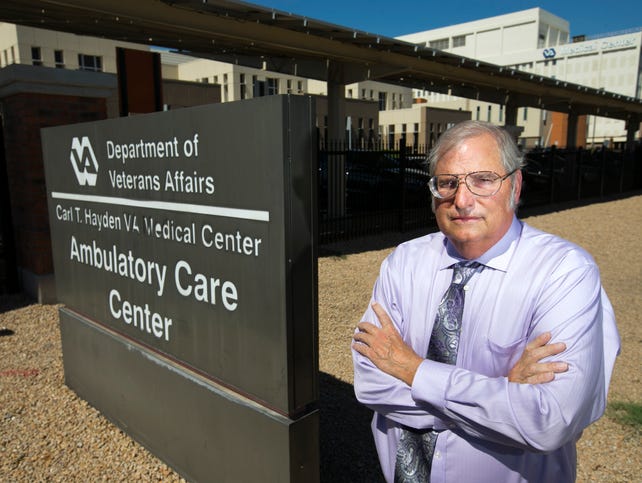One year later: The VA is still dragging its feet
Editorial board, The Republic | azcentral.com
Michael Chow/The Republic
At the Phoenix VA hospital, a substance-abuse specialist was placed on leave and saw his treatment program shuttered after he spoke out about the care his suicidal patients received.
Americans rarely are as unified on an issue as when it comes to getting quality health care for the nation's veterans.
After the Arizona Republic last year revealed shocking delays in Veterans Affairs care, 97 percent of respondents to a Washington Post/ABC News poll said the falsified records kept by VA hospitals and the extended wait times for doctor's visits was a serious problem. Eighty-two percent called it a "very serious" problem.
That sort of unanimity of concern usually prompts action on the part of elected leaders. And, at times, it seemed as though this infuriating scandal had broken through Washington's notorious bureaucratic resistance to change.
It hasn't. The VA has absorbed and neutralized every incremental attempt thus far at reform. Congress must recognize that its efforts thus far simply are not enough.

Jack Gruber / jack gruber/USA Today
Robert A. McDonald was appointed secretary of Veterans Affairs shortly after more
The initial reaction to the scandal was encouraging. Former Proctor & Gamble CEO Bob McDonald, himself a veteran, came on board as a new VA secretary with a reputation as a turn-around artist. In a rare burst of bipartisan comity, Congress allocated more than $16 billion to reform, including $10 billion toward a program to give vets a choice between the VA and health care provided by the private sector.
But a year after America learned that sick veterans were dying while waiting to see a VA doctor, not nearly enough has changed. The bureaucracy is winning.
A recent review of government data by The Associated Press found as many veterans are waiting interminably for an appointment with a VA doctor as before the scandal broke. The data show almost identical percentages of patients are waiting between 30 and 90 days for an initial doctor's visit. The number of patients waiting longer than 90 days has almost doubled.
Perhaps this is the predictable result of moving from a deceptive, double-book appointment system to one that accurately reflects wait times. But while transparency may be progress, veterans are still waiting too long.
The AP's analysis is no anomaly. The VA reacted to the "Choice Card" with a level of rear-guard sandbagging that made it clear the bureaucracy would fight reform tooth and nail. Across the country, sick vets, especially those in rural areas, have complained bitterly of the VA's efforts to define the parameters of the Choice Card program so narrowly as to make it nearly useless.
The VA "calls the (Choice Card) program 'non-veteran care,'" said Sen. John McCain in a recent meeting with The Republic editorial board. "What kind of connotation is that?"
McCain said he was encouraged at first by McDonald's appointment as VA secretary. But since?
"We've been disappointed," he said.

Michael Chow/The Republic
Exterior of the Carl T. Hayden Veterans Affairs VA Medical Center in Phoenix May 28, 2014.
Former Maricopa County Attorney Rick Romley, himself a severely wounded Vietnam War vet, expressed in a Friday My Turn the deep concern of wounded war vets who worry the VA might not be doing the job the nation promised.
"Regrettably, that is in question," he wrote.
The notorious VA vindictiveness lingers, even after the agency was publicly called out for seeking vengeance against its whistleblowers.
This month, The Republic's Dennis Wagner wrote about a substance-abuse specialist at the Phoenix VA hospital who was placed on leave — and his specialized treatment program shut down — after complaining publicly that his suicidal patients were receiving sub-par care.
The gall is almost too brazen to contemplate. The Phoenix VA, the epicenter of the VA's greatest-ever patient-care scandal, remains so comfortable in its sense of bureaucratic invulnerability that it still casually pummels whistleblowers into silence.
This is not the behavior of an agency that has learned its lesson. Still forcing vets to wait for appointments interminably. Still lashing out at whistleblowers. Still resisting modest changes in its provision of care.
Give the agency points for consistency. Its response last summer to demands for reform basically amounted to a promise: We'll give you more bloat in exchange for more money. And on that avowal, the VA delivered: A new $630 million VA hospital scheduled for completion this year in Denver now will cost at least $1.73 billion and won't be finished until 2017. At least.
The VA one year later is not an agency on the road to real change. It is an agency winning the rear-guard battle of attrition. It is intent on outlasting those calling for meaningful reform. And, so far, it is.

Michael Chow/The Republic
Army veteran Dr. Jacob Amrani, MD, vents his frustrations during a town hall at the American Legion in Phoenix on May 13, 2014.
Last July, The Republic argued that the VA would fight reform. It has. We predicted it would foot-drag. It did.
And we predicted that the only reform that would result in quality health care would involve a radical downsizing that re-focuses VA care on ailments unique to service veterans: treating physical and emotional war wounds and related specialties.
Last August, the floor of Congress was spilling over with lawmakers eager to put on the record their efforts on behalf of veterans. Those efforts have proved insufficient. The work that is genuinely above and beyond the call of congressional duty must start now.
The VA bureaucracy resists change because it knows it has allies, in Congress and among mainstream veterans groups that have a large stake in maintaining the organization's status quo.
It will take courage to overcome them, to demand that the VA be reduced to a manageable size.
It will take a real commitment to the only people who really count in this struggle, the veterans themselves.
Otherwise, the forces of resistance will win. Is this our legacy to our service veterans? That more of the same is good enough? It isn't for us. It certainly isn't for our vets. It shouldn't be good enough for any American.


No comments:
Post a Comment